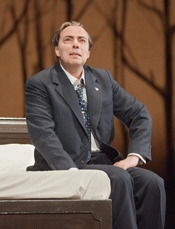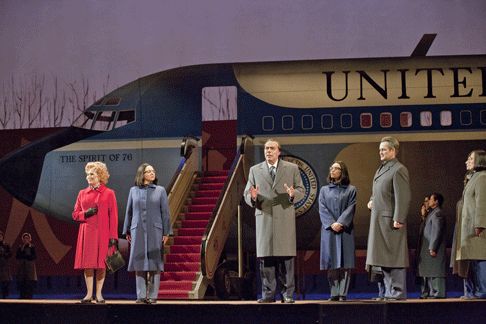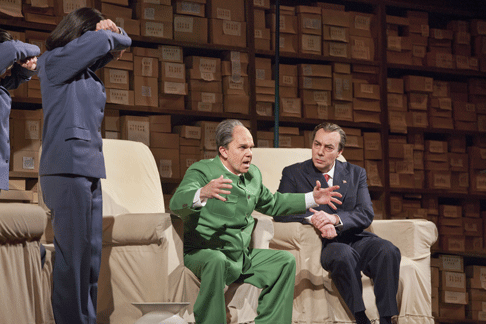
07 Feb 2011
Nixon in China, New York
Preparing for the Met premier of Nixon in China, I resolved to forget—or place on hold—everything I remembered, or thought I remembered, about the real persons who are characters in this opera,
English Touring Opera are delighted to announce a season of lyric monodramas to tour nationally from October to December. The season features music for solo singer and piano by Argento, Britten, Tippett and Shostakovich with a bold and inventive approach to making opera during social distancing.
This tenth of ten Live from London concerts was in fact a recorded live performance from California. It was no less enjoyable for that, and it was also uplifting to learn that this wasn’t in fact the ‘last’ LfL event that we will be able to enjoy, courtesy of VOCES8 and their fellow vocal ensembles (more below …).
Ever since Wigmore Hall announced their superb series of autumn concerts, all streamed live and available free of charge, I’d been looking forward to this song recital by Ian Bostridge and Imogen Cooper.
Although Stile Antico’s programme article for their Live from London recital introduced their selection from the many treasures of the English Renaissance in the context of the theological debates and upheavals of the Tudor and Elizabethan years, their performance was more evocative of private chamber music than of public liturgy.
Evidently, face masks don’t stifle appreciative “Bravo!”s. And, reducing audience numbers doesn’t lower the volume of such acclamations. For, the audience at Wigmore Hall gave soprano Elizabeth Llewellyn and pianist Simon Lepper a greatly deserved warm reception and hearty response following this lunchtime recital of late-Romantic song.
For this week’s Live from London vocal recital we moved from the home of VOCES8, St Anne and St Agnes in the City of London, to Kings Place, where The Sixteen - who have been associate artists at the venue for some time - presented a programme of music and words bound together by the theme of ‘reflection’.
'Such is your divine Disposation that both you excellently understand, and royally entertaine the Exercise of Musicke.’
‘And there was war in heaven: Michael and his angels fought against the dragon; and the dragon fought and his angels, And prevailed not; neither was their place found any more in heaven … that old serpent … Satan, which deceiveth the whole world: he was cast out into the earth, and his angels were cast out with him.’
There was never any doubt that the fifth of the twelve Met Stars Live in Concert broadcasts was going to be a palpably intense and vivid event, as well as a musically stunning and theatrically enervating experience.
‘Love’ was the theme for this Live from London performance by Apollo5. Given the complexity and diversity of that human emotion, and Apollo5’s reputation for versatility and diverse repertoire, ranging from Renaissance choral music to jazz, from contemporary classical works to popular song, it was no surprise that their programme spanned 500 years and several musical styles.
The Academy of St Martin in the Fields have titled their autumn series of eight concerts - which are taking place at 5pm and 7.30pm on two Saturdays each month at their home venue in Trafalgar Square, and being filmed for streaming the following Thursday - ‘re:connect’.
The London Symphony Orchestra opened their Autumn 2020 season with a homage to Oliver Knussen, who died at the age of 66 in July 2018. The programme traced a national musical lineage through the twentieth century, from Britten to Knussen, on to Mark-Anthony Turnage, and entwining the LSO and Rattle too.
With the Live from London digital vocal festival entering the second half of the series, the festival’s host, VOCES8, returned to their home at St Annes and St Agnes in the City of London to present a sequence of ‘Choral Dances’ - vocal music inspired by dance, embracing diverse genres from the Renaissance madrigal to swing jazz.
Just a few unison string wriggles from the opening of Mozart’s overture to Le nozze di Figaro are enough to make any opera-lover perch on the edge of their seat, in excited anticipation of the drama in music to come, so there could be no other curtain-raiser for this Gala Concert at the Royal Opera House, the latest instalment from ‘their House’ to ‘our houses’.
"Before the ending of the day, creator of all things, we pray that, with your accustomed mercy, you may watch over us."
The doors at The Metropolitan Opera will not open to live audiences until 2021 at the earliest, and the likelihood of normal operatic life resuming in cities around the world looks but a distant dream at present. But, while we may not be invited from our homes into the opera house for some time yet, with its free daily screenings of past productions and its pay-per-view Met Stars Live in Concert series, the Met continues to bring opera into our homes.
Music-making at this year’s Grange Festival Opera may have fallen silent in June and July, but the country house and extensive grounds of The Grange provided an ideal setting for a weekend of twelve specially conceived ‘promenade’ performances encompassing music and dance.
There’s a “slide of harmony” and “all the bones leave your body at that moment and you collapse to the floor, it’s so extraordinary.”
“Music for a while, shall all your cares beguile.”
The hum of bees rising from myriad scented blooms; gentle strains of birdsong; the cheerful chatter of picnickers beside a still lake; decorous thwacks of leather on willow; song and music floating through the warm evening air.

Preparing for the Met premier of Nixon in China, I resolved to forget—or place on hold—everything I remembered, or thought I remembered, about the real persons who are characters in this opera,
to convince myself I knew no more about them than I do about, say, the Doges of Genoa or the Kings of Sweden (to recall other operas that mingle the political with the personal), and to attempt to appreciate the drama presented on stage, the music emanating from it (far too much of it coming through microphones), on that disinterested level.
This made for an intriguing but confusing evening: I suspect composer John Adams and his librettist, Alice Goodman, actually do want you to dwell on your recollections of Nixon, Mao, et al., to allow these to color their operatic take on events. Nixon is a meditation on the events of its era through the medium of opera, which is a new sort of focus to put on the form.
Nixon in China is not my kind of opera, but let us examine what kind of opera it is, and why the audience at the Met’s premiere—and at its earlier performances, in Houston, Brooklyn and around the world—have received it with enthusiasm.
There were, first of all, the performances, and for so many performances to delight an audience for three and a half hours argues that the composer has created parts that can be inventively sung, that give scope to the artist and joy to the listener. (This was not the case in the same composer’s Dr. Atomic, with its unconvincing dramatic trajectory and sidelong meditations.) True, all the singers were mic’d, at the composer’s insistence, as in all his operas, but some of them sounded mic’d and others—especially the women—did not.
Kathleen Kim as Madame Mao stole the show with her coloratura flights in the bravura number that concludes Act II, and was amusing in her down-and-dirty duet with the Chairman. Robert Brubaker, as Mao, sang rather too forcefully for a man tottering on the brink of the grave, brusquely demolishing every attempt at flattery offered him by the unconvincing Americans. (In an amusing touch, his statements are “translated” by three secretaries, producing just about the only vocal harmonies of the evening.) Janis Kelly as Pat Nixon was affectingly hopeful, singing almost conversationally, enduring the tedium of a First Lady’s tour and an unemotional marriage in an appealing, almost tragic performance. Richard Paul Fink made a deliciously sinister pixie of Henry Kissinger and also sang the brutal landlord figure in a Chinese Revolutionary opera. Russell Braun sang a fading, dignified, melancholy Chou En-lai. Only James Maddalena, who has sung the title role in most performances of the opera since its premiere in 1987, sounded, on his Met debut, either long past major roles or under a severe unannounced cold. All these except Mr. Maddalena held our attention, sinking their teeth into roles the composer had filled with juicy meat. There is not much in this opera of confrontation, of music that erupts from vocal interaction; it is, rather, a series of static narratives, drama almost in the Handelian manner, singing heads for talking heads, if you will.
For me, though, the vocal stars of the performance were the Met chorus, which has been extraordinary in everything for the last couple of years. Their pronunciation of words was especially crisp and clear, their enthusiasm of mood infectious when, say, abruptly transformed from Party guests to pig farmers. I think I’d enjoy the Met chorus if they were singing the phonebook. The Chinese phonebook.
 Janis Kelly as Pat Nixon, Teresa S. Herold as the Second Secretary to Mao, James Maddalena as Richard Nixon, Ginger Costa Jackson as the First Secretary to Mao, Russell Braun as Chou En-lai
Janis Kelly as Pat Nixon, Teresa S. Herold as the Second Secretary to Mao, James Maddalena as Richard Nixon, Ginger Costa Jackson as the First Secretary to Mao, Russell Braun as Chou En-lai
The Peter Sellars production is very faithful to those shots I dimly remember of the original telecast of an earlier Sellars production. Those who saw Nixon in Brooklyn twenty years ago do not recall that Pat and Dick became so involved in the “Wicked Landlord Whips Peasant Girl” ballet in the Peking Opera scene, to the point of interfering with the characters onstage, but by that point in the story the naturalism of the first half of the opera was beginning to evaporate, borne on the wings of Adams’s repetitive, hypnotic accompaniments to unheard melodies. His mastery of suggestion became especially witty in the last act, the presentation of a row of beds occupied by all the characters as they suffer, chat, hallucinate, meditate, have sex or die: Pat recollects the dance music of forties films (two dancers oblige by reproducing such steps—Mark Morris created the witty choreography) and the orchestra plays no such tune but, rather, the tingling accompaniment that might lie beneath it, suggesting a step or a mood of elegance such as might linger in Pat’s mind from those forgotten, forgettable films and their hallucinations of romance. This in turn leads to a highly erotic reverie for the dying Mao and Chiang Ch’ing, whose marriage, however bloody it has become (and if we did not know all the hideous details twenty-five years ago, we certainly know them now), was once based upon a lustful and illicit affair, recalled joyously here.
The curious thing is that the audience for three or four hours of classical entertainment has come to delight in this sort of tableau, this elevation of the humans we have actually known to an archetypal status, and that opera is today considered the proper accolade to the achievement of a certain sort of celebrity, political or otherwise. This makes one wonder what opera, what singing rather than living, now implies to us. In the eighteenth century, operas seldom dealt with historical figures, and those that did dealt with ancient ones—Caesar, Cleopatra, Alfred the Great—in whom the monarchs of the day could see their own powers idealized, virtue rewarded, villainy dissipated. In the nineteenth century, when the bourgeois came to power, historical figures were shown in a lurid light, tainted by their power—and if they were not quite so antique, still, they were seldom closer in time than the previous century.
 Robert Brubaker as Mao Tse-tung and James Maddalena as Richard Nixon
Robert Brubaker as Mao Tse-tung and James Maddalena as Richard Nixon
Since World War II, especially in the United States, the operatic gift that has never quite seemed rooted in our soil has flowered into operatic treatments of Susan B. Anthony, Lizzie Borden, Carrie Nation, Malcolm X, Harvey Milk and J. Robert Oppenheimer—with Anna Nicole Smith soon to come. Whatever Ms. Smith’s charms, her celebrity seems of the most tendentious sort. Does anything about it call for gorgeous celebration? Is the whole idea not a spoof of opera to begin with? Do any of these pieces have the potential for a theatrical life removed from our memories of headlines? Yes: Susan B. Anthony had the luck to have an opera of genius written about her, The Mother of Us All. But the other works did not deal in archetypes; they are the musical equivalent of reportage, their substance gone once half the audience no longer knows what Nixon actually did. Modern celebrity opera is a sort of oral history if you like.
Returning to Nixon in China, one should mention that the piece was conducted by the composer, making his house debut, and that on several occasions it seemed to me that brasses and saxophones intruded a bit off-kilter and that certain rhythms were ragged—but I do not know the score well enough to be sure these moments were not intentional. There were moments of magic, especially in the “Peking Opera” ballet, and the final act was very beautiful, an extended concerted passage that never quite concerted: Nearly all the singers continued to sing alone, perhaps stressing their isolation in the drama, in the world. Or perhaps that was not the intent.
John Yohalem